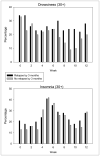Subjective sleep disturbance during a smoking cessation program: associations with relapse
- PMID: 21482029
- PMCID: PMC3588159
- DOI: 10.1016/j.addbeh.2011.03.001
Subjective sleep disturbance during a smoking cessation program: associations with relapse
Abstract
Background: Sleep disturbance may affect smoking cessation efforts. We describe sleep changes across three months among women in a smoking cessation program and tested whether sleep disturbances at baseline and 1 month post-quit attempt predicted smoking status at three months.
Methods: Participants (N=322) were women in a randomized, clinical trial for smoking cessation. Sleep disturbances, as well as, insomnia, drowsiness, and sleep quality were evaluated prior to and during three months of cessation treatment. Repeated measures mixed models evaluated change in sleep over time by smoking outcome status. Logistic regression analyses determined whether sleep disturbances at baseline and 1 month post-quit were associated with smoking status at 3 months.
Results: Sleep disturbances were reported by more than 25% of women. Drowsiness, insomnia, and sleep quality changed over time. However, contrary to our hypotheses, none of the sleep variables at either baseline or 1 month post-quit attempt was associated with relapse (p's>.05).
Conclusions: Although mild to severe drowsiness was reported by more women who relapsed than those who remained abstinent, none of the sleep disturbance symptoms predicted smoking relapse. Given high rates of sleep disturbances among women smokers, better prospective evaluations of the relationship of sleep disturbances to smoking cessation treatment outcome are needed.
Copyright © 2011 Elsevier Ltd. All rights reserved.
Conflict of interest statement
The authors have no conflicts to disclose.
Figures

References
-
- Aubin HJ. Tolerability and safety of sustained-release bupropion in the management of smoking cessation. Drugs. 2002;62(2):45–52. - PubMed
-
- Beck AT, Ward CH, Mendelson M, Mock J, Erbaugh J. An inventory for measuring depression. Archives of General Psychiatry. 1961;4:561–571. - PubMed
-
- Bohadana A, Nilsson F, Rasmussen T, Martinet Y. Gender differences in quit rates following smoking cessation with combination nicotine therapy: influence of baseline smoking behavior. Nicotine and Tobacco Research. 2003;5:111–116. - PubMed
-
- Colrain IM. The impact of tobacco dependence on sleep disorders. Insomnia. 2005:4–11.
Publication types
MeSH terms
Grants and funding
LinkOut - more resources
Full Text Sources
Medical

